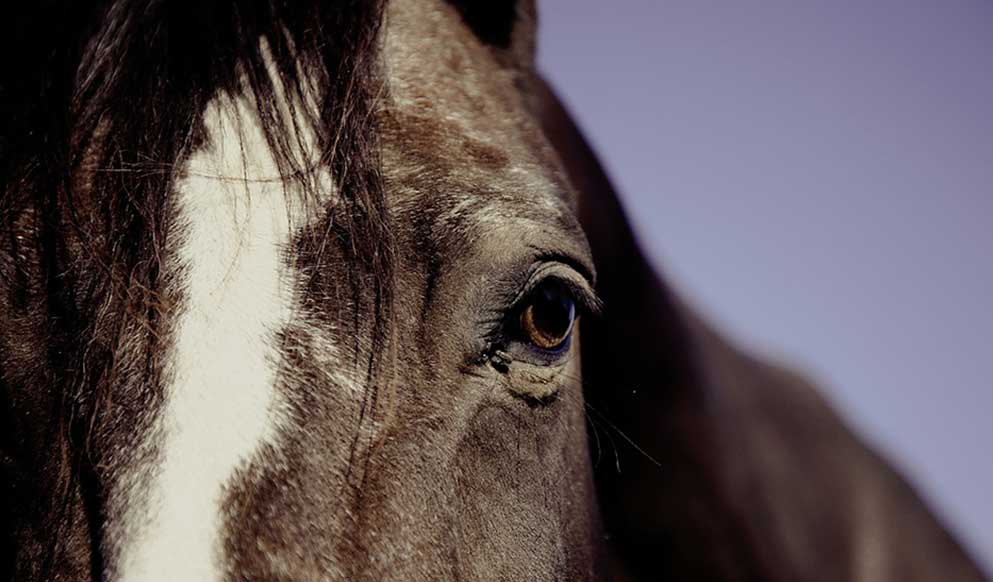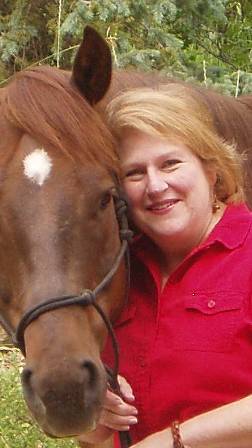
by Juliet M. Getty, Ph.D.
As if aging isn’t hard enough! Creaky joints, sagging backs, loose teeth, increased infections, poor digestion, and embarrassing gassiness -- just a few of the problems associated with getting older (for your horse, not you!).
But what was once a given in youth, now turns into a deficiency – vitamin C must now be added to the diet. You see, young horses are able to produce all the vitamin C they need for every-day health. This is why you typically do not see it added to commercially fortified horse feeds.
But as horses get up in years, they are less able to manufacture vitamin C. Decreased liver function is the main reason, but it can also be due to a decline in hindgut microflora and an increased propensity for pituitary dysfunction.
Why is vitamin C so important?
It prevents oxidative damage to your horse’s tissues and organs. In other words, it is an antioxidant. Antioxidants donate electrons to highly volatile, damaging molecules known as free radicals. Free radical production is accelerated during any type of physical or mental stress, muscle and joint inflammation, allergies, illness/injury, or exposure to toxins and pollutants.
But once free radicals receive their missing electron from vitamin C, they are neutralized – calmed down – and are no longer harmful.
Vitamin C has two other major roles
While its antioxidant capability is paramount to your horse’s overall health, vitamin C protects your horse in two other significant ways:
- Collagen synthesis. Collagen is a protein that creates a matrix within bones and joints to which minerals and other substances can attach. It is also part of connective tissue and maintains blood vessel integrity. Therefore enough vitamin C is important for keeping bones and joints healthy, reducing tooth loss, as well as preventing ruptured capillaries than can lead to abscesses.
- Natural antihistamine. Horses that suffer from respiratory or skin allergies will benefit from additional vitamin C. As an antihistamine, it reduces the histamine response, making your horse more tolerant to allergens and hence, more comfortable.
Finding the right supplement
Vitamin C is known as ascorbic acid. It can be derived from food or flowers (e.g., rose hips) or can be made in a laboratory. Regardless of the source, they are chemically identical, so there is no need to spend more on natural vitamin C. Ascorbic acid comes in several different forms, all similar in absorption and efficacy:
- Buffered mineral acorbates. These are less acidic. Horse preparations typically mix vitamin C with calcium or magnesium to ease digestive upset. These forms may be beneficial for horses with digestive ulcerations or chronic diarrhea.
- Ester-C. Ascorbic acid is chemically esterified (attached) to calcium. It also contains vitamin C metabolites that may be better absorbed, and easier on the digestive tract lining. There is little scientific basis for this but in cases where a horse is suffering from gastric ulcers, it may be helpful.
- Ascorbic acid with bioflavonoids (such as quercetin, ruin, and hesperidins). This complex may allow for better vitamin C absorption. Bioflavonoids are also beneficial for respiratory allergies.
- Ethyl cellulose coated ascorbic acid. This coating helps improve shelf life, especially when mixed with minerals that can promote oxidation.
Dosage
Since vitamin C is water soluble, excess amounts are easily excreted in urine. Therefore, it is best to divide dosages between meals to avoid urinary losses. It also tends to be bitter-tasting, so less at one time will be better received.
I routinely recommend vitamin C supplementation for all horses in their late teens (unless they are grazing on healthy pasture for at least 8 hours each day). Start by adding 3 to 5 mg per pound of body weight per day. Once your horse is over 20, give him 10 mg for every pound of body weight. For more intense needs, the National Research Council (NRC) suggests an upper safe limit of 44 mg of vitamin C per kg of body weight. For an 1100 lb (500 kg) horse, this can be as high as 22,000 mg per day.
Protect your supplement
If you have a container of vitamin C sitting in your hot barn, protect it from a cruel fate — keep it in a cool, dry place where the container is sealed shut. Refrigeration is fine. Purchase small sizes unless you are feeding it to several horses. Your supply should be finished within six months.
Remember, your older horse needs vitamin C to replace what he no longer produces on his own. Therefore, he should be supplemented indefinitely, for the remainder of his life.
Helpful supplements
If your horse needs vitamin C, consider the following:
· Pure C (Vita-Flex) is pure ascorbic acid.
· C-442 (Horsetech) is buffer, coated vitamin C for longer shelf life.
· Ester-C (Med-Vet Pharmaceuticals) offer esterified vitamin C to help horses with ulcers.
About the Author

Juliet M. Getty, Ph.D. has been working with horse owners for more than 25 years. A pioneer in free choice forage feeding, Dr. Getty's philosophy is founded on feeding a horse in sync with his natural needs and instincts. She approaches equine health from a holistic perspective and considers nutrition a critical (and too often overlooked) element in the prevention and treatment of disease and disorders. Her unbiased opinions and recommendations are based on scientific research and are independent of feed, supplement, or pharmaceutical company influence. Through private consultations, she designs customized feeding plans to promote horse's health, reverse illness, and optimize performance; she believes every horse owner should include sound nutrition practices to give every horse a lifetime of vibrant health.
Dr. Getty lives in Denton, Texas, in the Dallas/Fort Worth area with her husband.
This article originally appeared on Getty Equine Nutrition and is published here with permission.
Find more informative articles in our section on Health & Education, Bedding & Feed or Supplements.

































